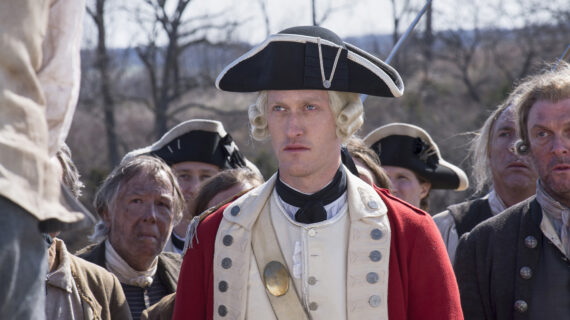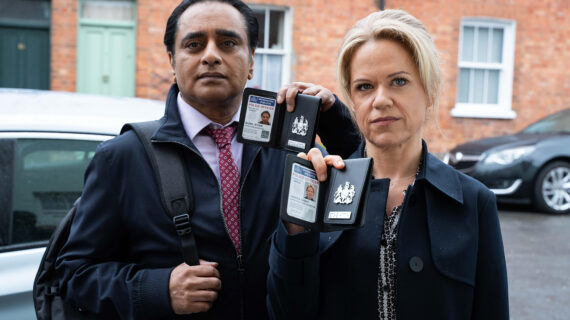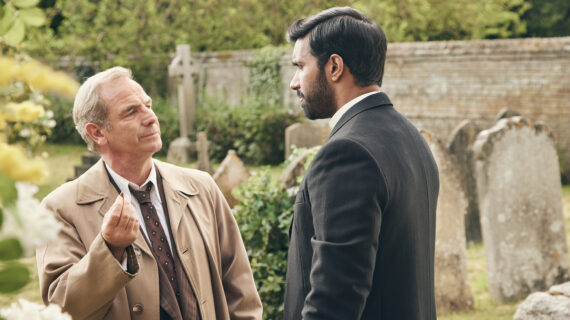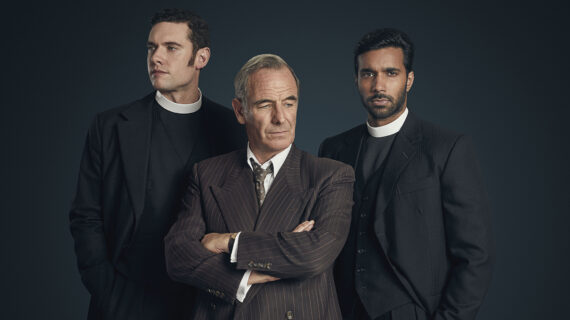Marisa Wojcik:
Welcome to Noon Wednesday. I’m Marisa Wojcik, a multimedia journalist with Here & Now on Wisconsin Public Television. Wisconsin has a new state treasurer, and the very person who was elected this past November is the person who saved the office from dissolution. And Sarah Godlewski joins us now. Thanks so much for being here.
Sarah Godlewski:
Thanks for having me, Marisa, it’s great to be here.
Marisa Wojcik:
So I want to let people know right away, Sarah and I both graduated from Eau Claire Memorial High School.
Sarah Godlewski:
Go Old Abes!
Marisa Wojcik:
But we’re about 10 years apart. So we haven’t met before. I want to start with you campaigned around the state to keep the office of the State Treasurer intact.
Sarah Godlewski:
Right.
Marisa Wojcik:
Why did you do that?
Sarah Godlewski:
So, Marisa, it was never my dream to run for State Treasurer and now be in this office, but I have a background in investing and in finance. And one of the things at the time that really concerned me was how we’re 50th for startups in the country. And so one of the things I was doing was actually investing in startup communities. And so I wanted to work with the State Treasurer to figure out how we could work together to maybe think of something to help this problem in Wisconsin. I come to find out that the State Treasurer isn’t really doing anything, and, oh by the way, there’s this referendum to potentially remove the office. And so I was like that’s crazy because, when you lose your financial officer, who’s going to be our advocate? We would’ve been, at the time, the only state to not have a financial officer if this referendum would’ve passed. And so, in talking to people, I’m like are we doing anything about it? And they go I don’t think so, Sarah. And so I ended up calling literally The National Association of State Treasurers, and they invited me to their summer conference where I met all the other financial officers for the states and just realized how far behind Wisconsin was falling because we didn’t have an advocate for our overall financial health. And that’s when I helped to co-found the group Save our Fiscal Watchdog. It was me and former Republican Treasurer Jack Voight. And we traveled the state talking about what the State Treasurer should be doing for Wisconsinites, how this is a critical constitutional office that has been a part of our state since 1848, and when the referendum… Constituents said, literally 62%, this is critical.
Marisa Wojcik:
So what did you hear from people as you were traveling around the state? Did they understand what the role of the State Treasurer was, did they understand what was going on, or do a lot of people, do you do a lot of education around what this office can do?
Sarah Godlewski:
There was a lot of education, and I think people were fascinated that this office, for example, should be the state’s fiscal watchdog, should be looking at our finances. The state should also be looking at our investments and make sure we’re investing in Wisconsin wisely and having good returns. This office also does things like unclaimed properties, so when you lose your property, promoting it, reuniting people. And so I was just fascinated that people were surprised. They’re like why wouldn’t we want this?
Marisa Wojcik:
So your predecessor, Matt Adamczyk, was the one who was lobbying or campaigning for this office to be eliminated.
Sarah Godlewski:
Right.
Marisa Wojcik:
He said that the office no longer has any significant responsibilities. Were the things that you just listed things that were still being done, or were they being neglected? And what could the office do previously but can’t do now?
Sarah Godlewski:
Yeah, so let’s look at what the office, what it should be doing. So one of the first things I did when I was elected was I worked with lawyers and the Legislative Reference Bureau to identify what should this office be doing. And there are 17 statutory requirements that this office should be doing for Wisconsinites, and it ranges from everything from we sign the state checkbook. So one of the things, Marisa, that I’ve done most recently is I put together a video and gave people a tour of my office, and one of the things that’s in my office is called the Signagraph. And it’s literally where you sign at once, and that signs like 50 other checks. So we sign the state checkbook. We service the Treasurer for the state’s investment boards, for the Employee Trust Fund. We’re supposed to be working with the governor on financial management. And so these are all things that this office should be doing, and I don’t believe that they were… No one has been doing them for the last four years, unfortunately. So that’s what it should be doing. What was taken away from it over the years, there’s really a handful of things. One is cash management. So this goes back to having a separate check and balance. It’s looking at our cash balance and how are we spending it. Wisconsin right now is the only state where the State Treasurer does not manage cash management. So if you think about it, the way that it works right now is that currently in our government, the governor and the legislature, they tell you how they’re going to tax you, they tax you, they spend your money, and now they also account for it. What cash management was doing was taking some of that accounting functions out of it by managing our cash balance.
Marisa Wojcik:
But some of those responsibilities were either eliminated or they were transferred to other state agencies. Is there a problem with those that transferred to state agencies? The argument was that it is just making things more efficient and streamlining government.
Sarah Godlewski:
Yeah, so I think, looking at cash management, for example, let’s use that. When things were transferred, there’s a lack of checks and balances. So it goes back to the reason why we’re, I think, the only state that has cash management under the governor is because it was more of, at the time, I think, a power play, and that’s not effective government. Recently, the Legislative Audit Bureau came out on Friday with its recent audit, where it identified from the previous administration at least two incidents of lack of internal controls that can deal with cash management and checks. So again, this has been happening for the last couple of years, and I think now we have a responsibility. This is a new day, we’ve elected a new administration. Let’s now actually have some checks and balances with this.
Marisa Wojcik:
So you ran as a Democrat. Do you at all feel like, with a Republican- controlled legislature, that your hands are going to be tied, and it’s going to be really difficult to pursue any initiatives that you would like to?
Sarah Godlewski:
So my motto that I’ve been taking on the trail, and people give me a hard time, Marisa, is I always like to joke money’s not red or blue, it’s green. And I really believe that good government and good fiduciary responsibility is not a Republican value or a Democratic value, it’s a Wisconsin value. And so, to me, I’m not fighting for things that are partisan. This is just good government. And honestly, whether when I was working at the Pentagon or working in local government, I really believe that these are values that Wisconsinites want, which, again, is one of the reasons why I ran. I’m just trying to make sure we use our money wisely and we have the fiduciary health and responsibility that Wisconsinites are looking for.
Marisa Wojcik:
Have you been able to reach across the aisle at this point and make any gains in some bipartisan initiatives?
Sarah Godlewski:
Yeah, that’s, I think, one of the first things that we’ve been doing is reaching out to legislators on the Republican side and saying how can we work together? What would this look like? And to me, this is just the beginning. I look forward to building those relationships because their constituents asked, wanted this. Again, 62% of Wisconsinites, which is a landslide, said that they want this office to be their fiscal watchdog.
Marisa Wojcik:
Have you been getting a good reception?
Sarah Godlewski:
Yeah, I think people are like yeah, what does this look like, how can we do this? And so we are on, what is it, we just were inaugurated a week ago, but I do think that we’re going to not only continue these conversations but we’re going to figure out how can we do this together, because this is, again, a Wisconsin value that we need to figure out how to uphold.
Marisa Wojcik:
At the end of your first term, what do you hope the takeaway from Wisconsinites would be?
Sarah Godlewski:
So I think it really gets into three things. One is how have we developed a new standard for being that kind of fiscal watchdog for Wisconsinites? I think the second thing is how have we started the conversation and started to change our investment strategies that are win win? So right now we know, for example, in Wisconsin, there’s a Wisconsin venture fund that we have, but less than 23% of that is actually invested in Wisconsin, which that’s $300 million. So this is money that is going outside of the state, but it’s teachers, it’s public employees, that they want to bring this economic development back to the state, not outside of the state. So it’s looking at these win-win investment strategies and how we can be better about that. And then I think the third thing is looking at how we can create an environment for economic security. And so one of the things I’ve been talking about is financial literacy, and how can we look at financial exploitation of seniors? And so it’s issues that are affecting all of us across the state and addressing that.
Marisa Wojcik:
Again, it sounds like education seems like a big part of what you’re trying to do. How would you describe to someone in Wisconsin how the office of the State Treasurer directly impacts them if there’s a disconnect between understanding this office that they might not have known much about that was almost eliminated to now you’re stepping in and really wanting to expand that role?
Sarah Godlewski:
So let’s go with something that’s really easy is public education. So our office, we’re now the chair of the Common School Fund, and that office and that role, every year we provide anywhere between 30 to $40 million to all public schools in the state of Wisconsin. A lot of times, this is the only revenue stream that schools receive for books and technology, which I think is pretty important in the 21st century, technology for kids. So one of our responsibilities is making sure we invest that money wisely so we can have better returns so we can help public schools even more. And so this is just something that we’re doing every day. I think another good responsibility is tax dollars. How are they using our tax dollars? How are they spending it so it goes back to the transparency and accountability? So these are things that are just impacting us in our everyday lives that I’m not necessarily, I think that we’re not sure where it comes from, we just know government works.
Marisa Wojcik:
Well, Sarah, thanks so much for joining us, telling us a little bit about your job and also what you’re hoping to accomplish. And we’ll keep an eye on it and probably have you back.
Sarah Godlewski:
I would love to come back, and thanks for having us, Marisa.
Marisa Wojcik:
All right. Well, thanks for joining us on Noon Wednesday. If you would like to see more from Here & Now and Wisconsin Public Television, visit wpt.org, and we’ll see you next Wednesday.
Search Episodes
Related Stories from PBS Wisconsin's Blog

Donate to sign up. Activate and sign in to Passport. It's that easy to help PBS Wisconsin serve your community through media that educates, inspires, and entertains.
Make your membership gift today
Only for new users: Activate Passport using your code or email address
Already a member?
Look up my account
Need some help? Go to FAQ or visit PBS Passport Help
Need help accessing PBS Wisconsin anywhere?

Online Access | Platform & Device Access | Cable or Satellite Access | Over-The-Air Access
Visit Access Guide
Need help accessing PBS Wisconsin anywhere?

Visit Our
Live TV Access Guide
Online AccessPlatform & Device Access
Cable or Satellite Access
Over-The-Air Access
Visit Access Guide
 Passport
Passport

















Follow Us